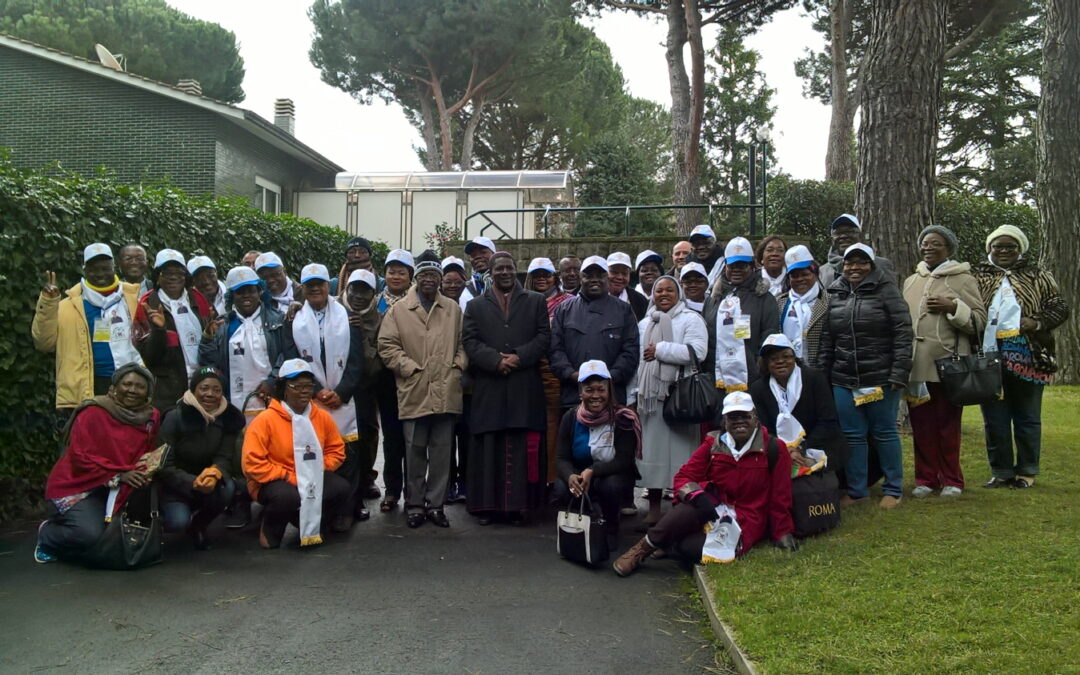
Mar 10, 2016 | Focolare Worldwide
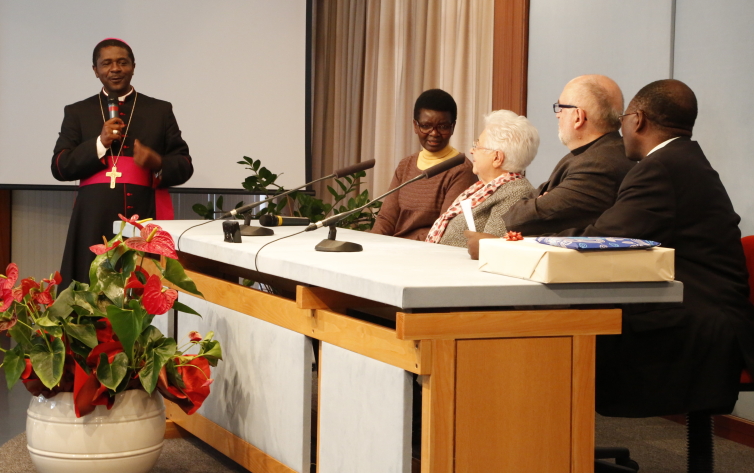 “We cannot talk about evangelization in Fontem without the Focolare Movement,” said Bishop Nkea standing in front of the television cameras during his visit to the International Centre in Rocca di Papa, Italy, on March 8. “Chiara Lubich went to Fontem 50 years ago, and she brought the Ideal [spirituality of unity]. That is why we have come here: to thank Chiara and the Movement for everything it has done for us in these 50 years. This is a pilgrimage of thanksgiving.” “The Diocese of Mamfe did not exist 50 years ago and Fontem was a lost village in the Cameroonian forest that was difficult to reach.” We cannot understand the Bishop’s words without returning to the history of an event that has been called the “miracle in the forest”. Fontem was the first permanent Mariapolis on the African continent. In 1966, several focolarini, doctors, went to help the Bangwa people who were being decimated with an infant mortality rate of 98%. A few months later, Chiara herself visited them: “That huge crowd of people gathered on the vast plane in front of the home of their Fon,” she would say in 1995, “appeared so united and so anxious to be elevated [. . .] that it seemed to me long prepared by Mary to embrace the Christian faith in its most integral and genuine form.” “The focolarini were believed because they did to Jesus what they did to the Bangwa, offering, above all, a witness of the love amongst themselves and towards everyone.”
“We cannot talk about evangelization in Fontem without the Focolare Movement,” said Bishop Nkea standing in front of the television cameras during his visit to the International Centre in Rocca di Papa, Italy, on March 8. “Chiara Lubich went to Fontem 50 years ago, and she brought the Ideal [spirituality of unity]. That is why we have come here: to thank Chiara and the Movement for everything it has done for us in these 50 years. This is a pilgrimage of thanksgiving.” “The Diocese of Mamfe did not exist 50 years ago and Fontem was a lost village in the Cameroonian forest that was difficult to reach.” We cannot understand the Bishop’s words without returning to the history of an event that has been called the “miracle in the forest”. Fontem was the first permanent Mariapolis on the African continent. In 1966, several focolarini, doctors, went to help the Bangwa people who were being decimated with an infant mortality rate of 98%. A few months later, Chiara herself visited them: “That huge crowd of people gathered on the vast plane in front of the home of their Fon,” she would say in 1995, “appeared so united and so anxious to be elevated [. . .] that it seemed to me long prepared by Mary to embrace the Christian faith in its most integral and genuine form.” “The focolarini were believed because they did to Jesus what they did to the Bangwa, offering, above all, a witness of the love amongst themselves and towards everyone.” 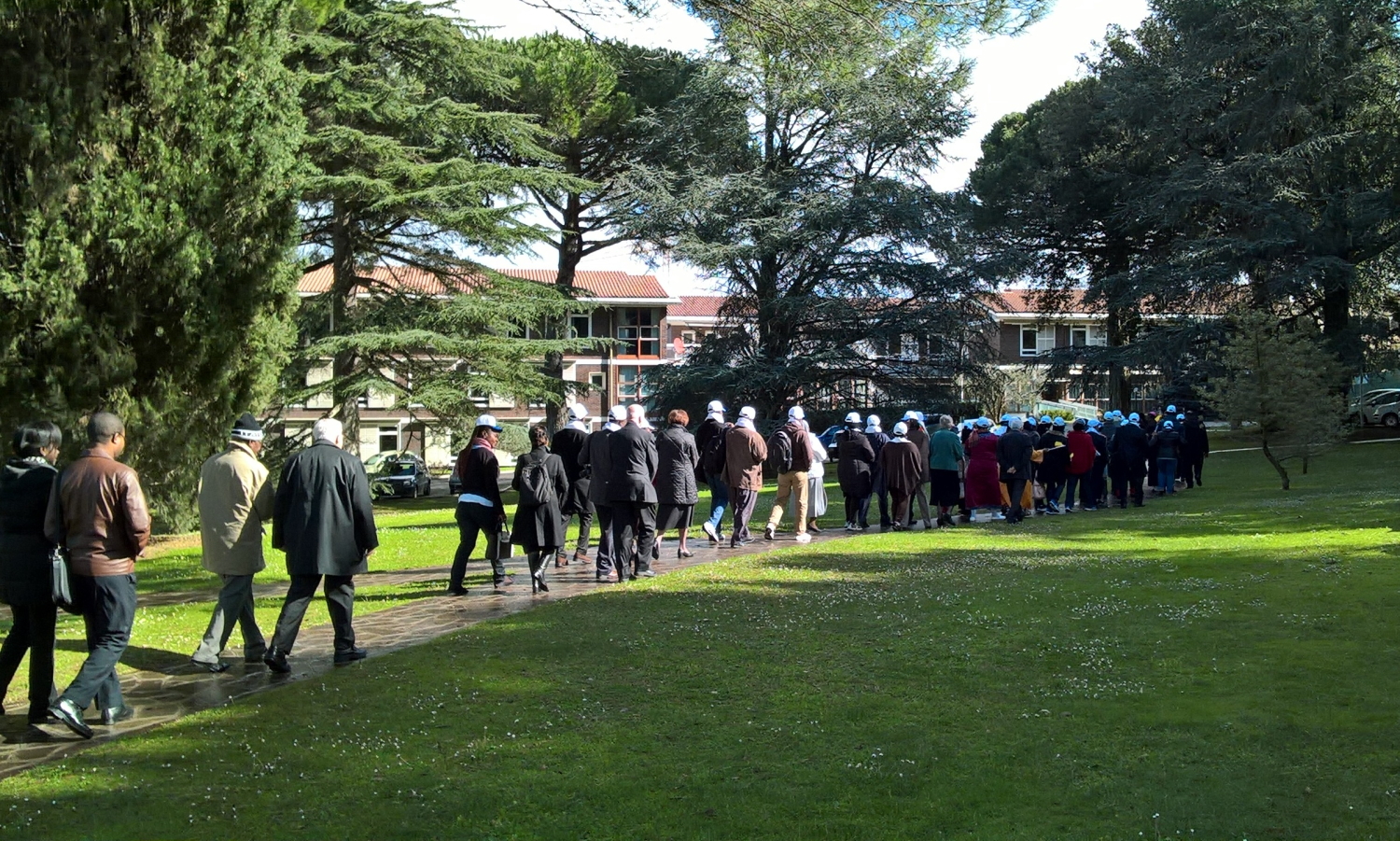 Today there is a hospital in Fontem, Mary Health of Africa, which serves a large part of the region; and a college, Mary Seat of Wisdom, which prepares students for university. With the help of focolarini priests, parishes have been opened in Menji, Fotabong, Fonjumetaw. Bishop Nkea declared: “Mainly, we learned mutual love and unity. I’m also Bangwa, so I’m speaking in the name of my people.” “We learned interreligious dialogue: What is important for us now is that we love one another, whether we are Christian or not, to live in this unity with each other.”
Today there is a hospital in Fontem, Mary Health of Africa, which serves a large part of the region; and a college, Mary Seat of Wisdom, which prepares students for university. With the help of focolarini priests, parishes have been opened in Menji, Fotabong, Fonjumetaw. Bishop Nkea declared: “Mainly, we learned mutual love and unity. I’m also Bangwa, so I’m speaking in the name of my people.” “We learned interreligious dialogue: What is important for us now is that we love one another, whether we are Christian or not, to live in this unity with each other.” 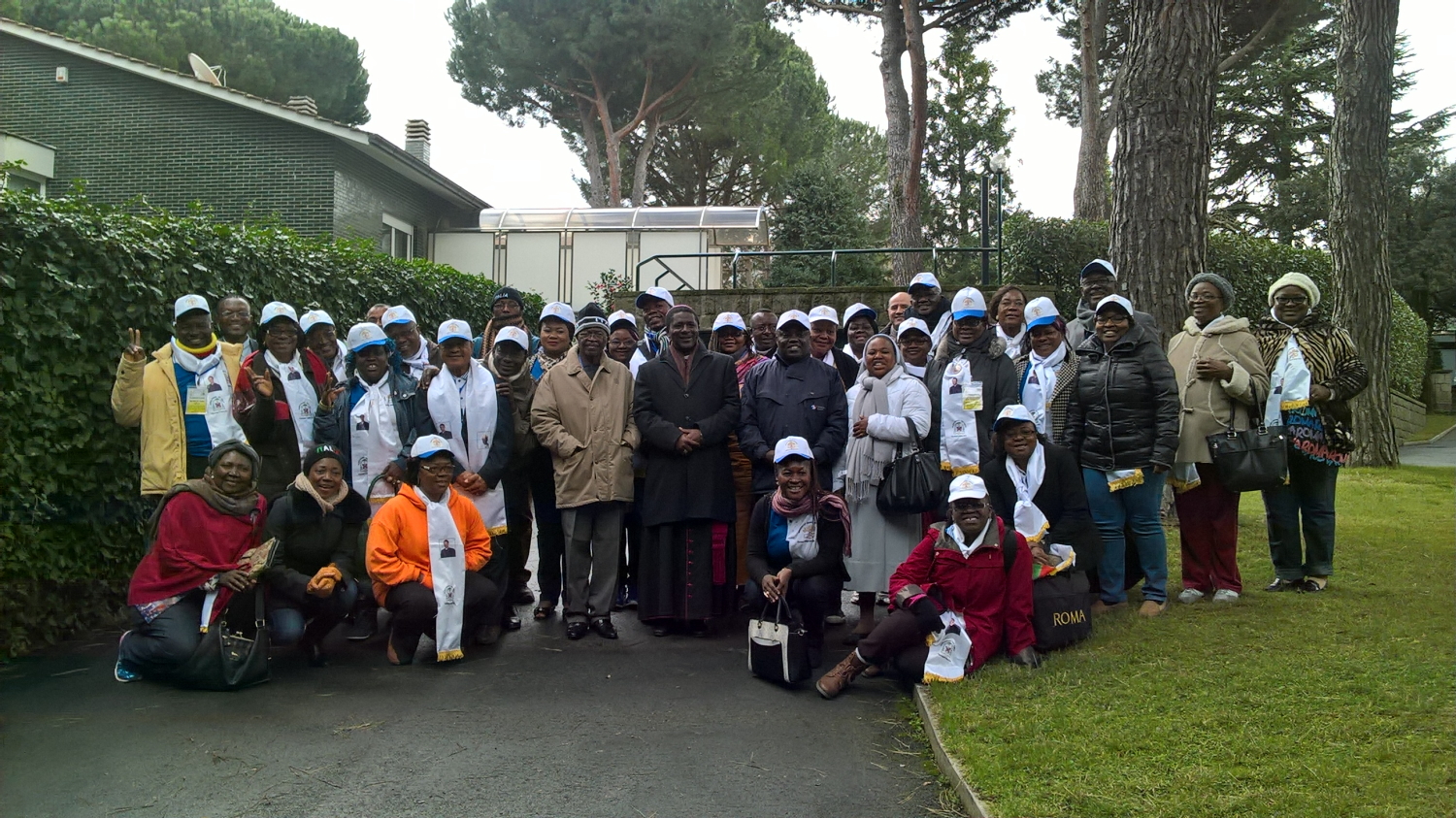 The delegation that had come to render homage to Chiara Lubich included bishops – Bishop Nkea and Emeritus Bishop Lysinge who was celebrating the 50th anniversary of his ordination to the priesthood – priests, women religious and many lay people. They are a living testimony to the communion in the diocese. They were welcomed at the International Centre of the Focolare by the Movement’s president, Maria Voce – who first visited Fontem in January 2009 – and the Movement’s co-president, Jesús Morán, who will visit Fontem this coming December. The visit of the delegation marked the opening of the 50th anniversary celebrations of the arrival of the spirituality of unity in Fontem (1966-2016) and will continue through the year. The visit to Chiara’s house was particularly moving. The day concluded with a solemn Mass in the chapel where Chiara rests. “Your pilgrimage here today bears witness to the fruits produced by that first visit of Chiara, which launched a Divine adventure that no one ever imagined,” Maria Voce said as she welcomed them. “You are the fruit of the life of these 50 years. It is a great joy for us and shows us the vitality of Africa. Fifty years have gone by and our wish to each other now is that we begin a new period, hopefully a long period for offering to God trees covered with fruits and with blossoms.” Jesús Morán commented: “There is an exchange of gifts between Africa and us. The charism of unity is a gift for Africa, and Africa is a gift for the whole Movement.”
The delegation that had come to render homage to Chiara Lubich included bishops – Bishop Nkea and Emeritus Bishop Lysinge who was celebrating the 50th anniversary of his ordination to the priesthood – priests, women religious and many lay people. They are a living testimony to the communion in the diocese. They were welcomed at the International Centre of the Focolare by the Movement’s president, Maria Voce – who first visited Fontem in January 2009 – and the Movement’s co-president, Jesús Morán, who will visit Fontem this coming December. The visit of the delegation marked the opening of the 50th anniversary celebrations of the arrival of the spirituality of unity in Fontem (1966-2016) and will continue through the year. The visit to Chiara’s house was particularly moving. The day concluded with a solemn Mass in the chapel where Chiara rests. “Your pilgrimage here today bears witness to the fruits produced by that first visit of Chiara, which launched a Divine adventure that no one ever imagined,” Maria Voce said as she welcomed them. “You are the fruit of the life of these 50 years. It is a great joy for us and shows us the vitality of Africa. Fifty years have gone by and our wish to each other now is that we begin a new period, hopefully a long period for offering to God trees covered with fruits and with blossoms.” Jesús Morán commented: “There is an exchange of gifts between Africa and us. The charism of unity is a gift for Africa, and Africa is a gift for the whole Movement.”
Leer more: 50th anniversary of the Focolare in Africa
The personal witness of the Fon of Fontem Lucas Njifua https://vimeo.com/91709757

Mar 7, 2016 | Focolare Worldwide
 “We got to know a family from Burundi who in the current terrible situation in their country, about which we hear very little, have left the country like many other families and come to Kampala where we live,”write us from Uganda. “The husband went back to Burundi so as not to lose his job and to be able to pay the rent on the house in Uganda and buy food for their children, including a three week old baby. “His wife had not been able to stay in Burundi when shooting began again in their city, as she had too vivid memories of all that had happened in the 1990s during the civil war. Then she had miraculously escaped death because the Headmaster of the school she attended had twice paid off soldiers who had come to the school on two consecutive days to look for her and the other girls. So, when the first signs of trouble began, the family had decided to go, leaving all they had behind in Bujumbura. They had brought other relatives with them, so there were 8 of them in all. “We heard that the rent did not cover furniture and that they had only 4 chairs in the living room: what could we do? We thought that four of our folding chairs, used occasionally when many people come to our house, would be made better use of in their house, so that at least everyone could sit and eat comfortably. “As we left we cut two pumpkins from the garden to take with us. We had planted a number of them almost by chance a few months earlier and they had picked up after the dry season and had been extremely useful in recent weeks! Moreover, just the day before we had received some food supplies. Providence has never been lacking over the last few months and it is truly by sharing it that the Gospel promise “give and gifts will be given to you” comes true. So we took two kilos of sugar, two of rice, one kilo of salt and a litre of oil and went to see the family. “Their house was new and clean and there were some unusual trimmings on the ceiling as well as a nice light fitting. But there were no beds in the bedrooms, only mattresses. In the living room there was a small round plastic table and four chairs, a little television in the corner on the floor with an antenna hanging over visitors’ heads. We could not see any toys or other furniture. “We went in with the chairs and spent two very happy hours with the family getting to know them better and sharing past memories and hopes for the future. The children are not going to school at the moment. The older ones want to go to university but it is much more expensive in Uganda than Burundi so it is not possible for now. Finding work is difficult too, as many people are unemployed and it is almost impossible for foreigners if you don’t know someone. What is more they don’t speak luganda, the local language, and English is not their mother tongue either. But they said “… We trust in God!”. “It was already 7.30 in the evening and we needed to go home. We all said goodbye. They were so happy we had come but as soon as we asked them to keep the chairs, and return them when they left that house, their faces lit up and they thanked us again and again! Before getting into the car they wanted to give us their blessing! On the way home I thought that four ordinary chairs and two pumpkins, once given, can fill the hearts, both of those who receive and those who give, with joy…” (S.M. Uganda)
“We got to know a family from Burundi who in the current terrible situation in their country, about which we hear very little, have left the country like many other families and come to Kampala where we live,”write us from Uganda. “The husband went back to Burundi so as not to lose his job and to be able to pay the rent on the house in Uganda and buy food for their children, including a three week old baby. “His wife had not been able to stay in Burundi when shooting began again in their city, as she had too vivid memories of all that had happened in the 1990s during the civil war. Then she had miraculously escaped death because the Headmaster of the school she attended had twice paid off soldiers who had come to the school on two consecutive days to look for her and the other girls. So, when the first signs of trouble began, the family had decided to go, leaving all they had behind in Bujumbura. They had brought other relatives with them, so there were 8 of them in all. “We heard that the rent did not cover furniture and that they had only 4 chairs in the living room: what could we do? We thought that four of our folding chairs, used occasionally when many people come to our house, would be made better use of in their house, so that at least everyone could sit and eat comfortably. “As we left we cut two pumpkins from the garden to take with us. We had planted a number of them almost by chance a few months earlier and they had picked up after the dry season and had been extremely useful in recent weeks! Moreover, just the day before we had received some food supplies. Providence has never been lacking over the last few months and it is truly by sharing it that the Gospel promise “give and gifts will be given to you” comes true. So we took two kilos of sugar, two of rice, one kilo of salt and a litre of oil and went to see the family. “Their house was new and clean and there were some unusual trimmings on the ceiling as well as a nice light fitting. But there were no beds in the bedrooms, only mattresses. In the living room there was a small round plastic table and four chairs, a little television in the corner on the floor with an antenna hanging over visitors’ heads. We could not see any toys or other furniture. “We went in with the chairs and spent two very happy hours with the family getting to know them better and sharing past memories and hopes for the future. The children are not going to school at the moment. The older ones want to go to university but it is much more expensive in Uganda than Burundi so it is not possible for now. Finding work is difficult too, as many people are unemployed and it is almost impossible for foreigners if you don’t know someone. What is more they don’t speak luganda, the local language, and English is not their mother tongue either. But they said “… We trust in God!”. “It was already 7.30 in the evening and we needed to go home. We all said goodbye. They were so happy we had come but as soon as we asked them to keep the chairs, and return them when they left that house, their faces lit up and they thanked us again and again! Before getting into the car they wanted to give us their blessing! On the way home I thought that four ordinary chairs and two pumpkins, once given, can fill the hearts, both of those who receive and those who give, with joy…” (S.M. Uganda)
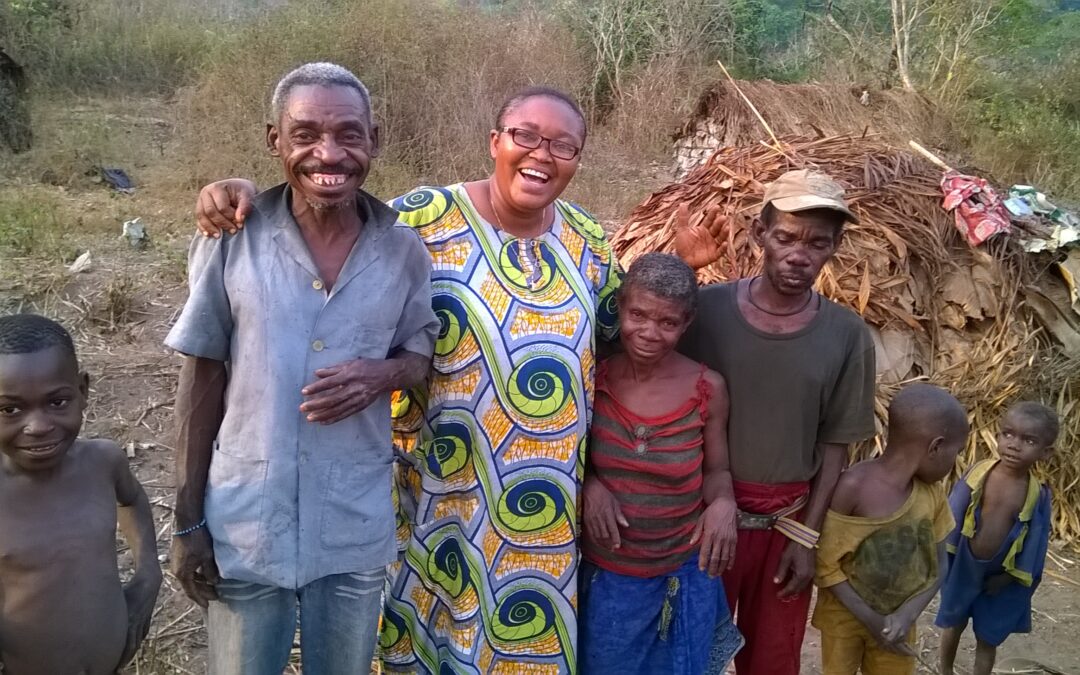
Mar 3, 2016 | Focolare Worldwide
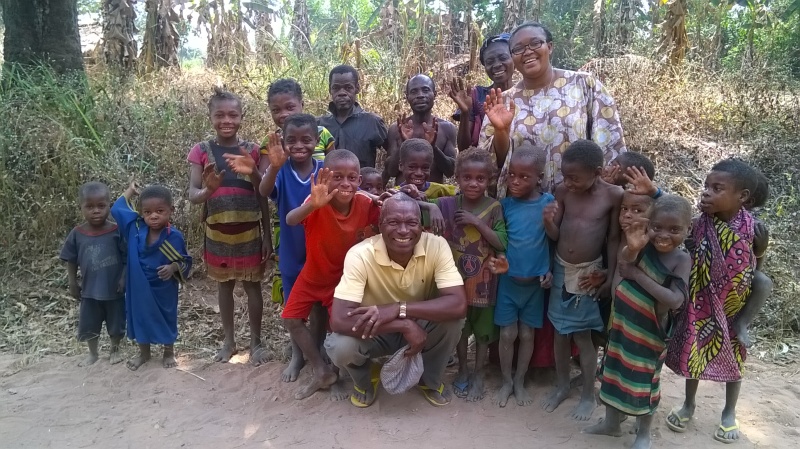 Nothing is the same in the capital city of the Central African Republic, after the visit of Pope Francis called it the “spiritual capital of the world.” Fidelia is a Congolese focolarina who has been living in Bangui for seven years. From 2012 until last September, she has seen with her own eyes the constant onslaught of armed clashes that over and over wiped out cities and villages, sowing seeds of horror and death everywhere. Now things appear quite changed and general opinion is that it was the visit of the Pope which marked the change in course. Fidelia comments: “Even in the provinces they’re talking about a before and an after. For example, the second round of presidential elections was held, and everything went fine. It was the same for the electoral campaign. But either one of them could have turned violent. Everyone is saying that when the Pope came, it was as if God himself had come, and so we can’t turn back now. They feel that the Pope took us ‘to the other shore’ and that we should continue moving forward all the way to true and lasting peace. Everyone seems convinced that if we want to reach social cohesian, forgiveness will be required, mercy and reconcilliation. You can sense a change of mentality beneath those words, a change of behaviour. Also the way we speak to one another – Muslims and Christians – has changed! Fidelia’s words are truly encouraging, not only for the Central African Republic, but for all the places in the world where the sound of weapons needs to stop so that solutions can be found through dialogue.
Nothing is the same in the capital city of the Central African Republic, after the visit of Pope Francis called it the “spiritual capital of the world.” Fidelia is a Congolese focolarina who has been living in Bangui for seven years. From 2012 until last September, she has seen with her own eyes the constant onslaught of armed clashes that over and over wiped out cities and villages, sowing seeds of horror and death everywhere. Now things appear quite changed and general opinion is that it was the visit of the Pope which marked the change in course. Fidelia comments: “Even in the provinces they’re talking about a before and an after. For example, the second round of presidential elections was held, and everything went fine. It was the same for the electoral campaign. But either one of them could have turned violent. Everyone is saying that when the Pope came, it was as if God himself had come, and so we can’t turn back now. They feel that the Pope took us ‘to the other shore’ and that we should continue moving forward all the way to true and lasting peace. Everyone seems convinced that if we want to reach social cohesian, forgiveness will be required, mercy and reconcilliation. You can sense a change of mentality beneath those words, a change of behaviour. Also the way we speak to one another – Muslims and Christians – has changed! Fidelia’s words are truly encouraging, not only for the Central African Republic, but for all the places in the world where the sound of weapons needs to stop so that solutions can be found through dialogue. 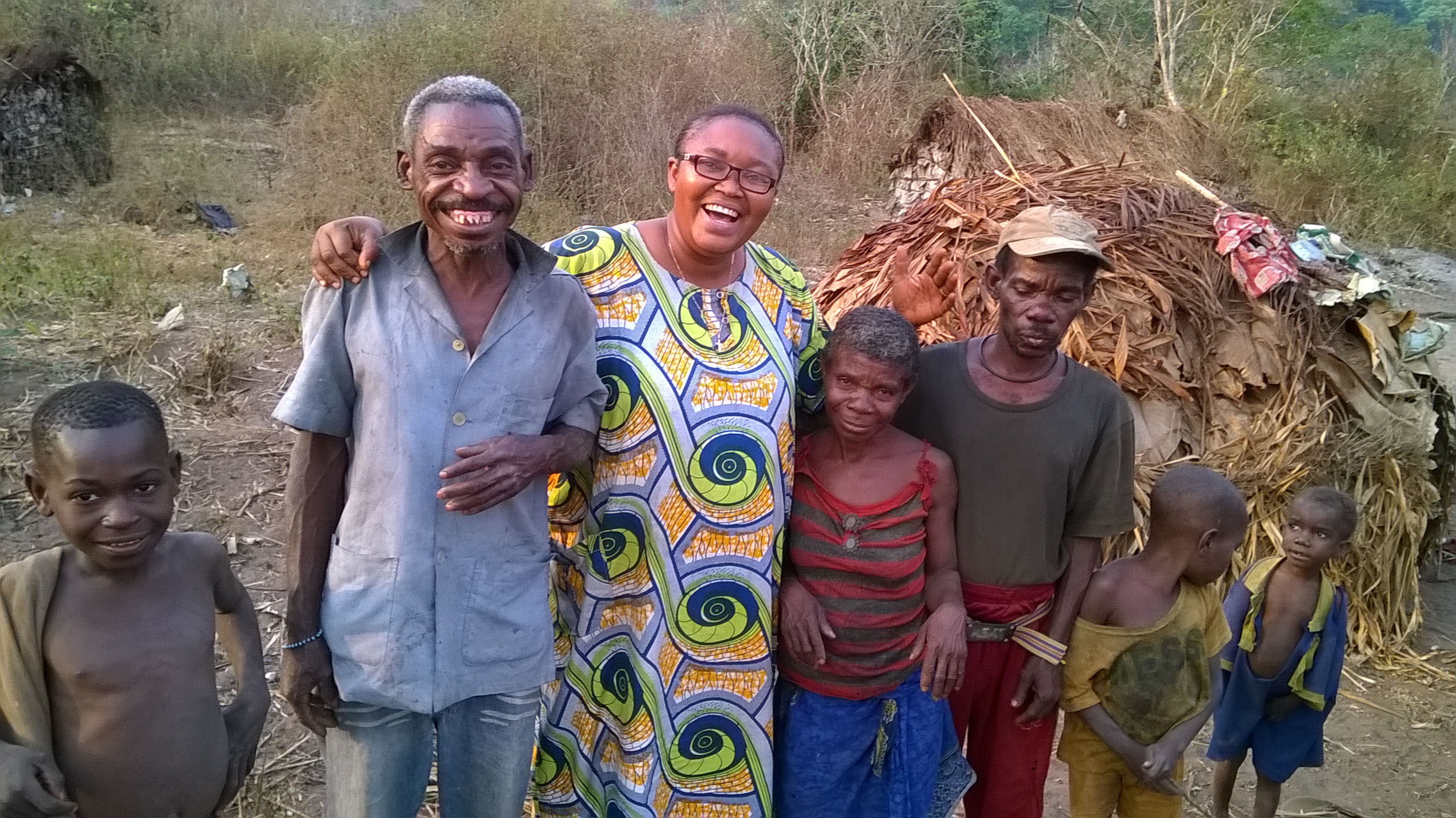 Fidelia also showed us other aspects of the life of Central Africa. She told us, for example, that in recent weeks she and three others of the Bangui had treked 400 km to reach the small city of Bambio, where a small community animated by the spirituality of the Focolare was begun with the help of a Capuchin missionary. Fidelia recounts: “We met several families there, many young people, all of them very motivated. Even though Father Umberto had to return to Italy, they carried on for all these years, continuing to gather and encourage one another in living the Gospel, with the help of a book by Chiara Lubich which he had left to them.” Meeting this community that had kept the flame of the Gospel burning for over twenty years, filled her with joy and amazement. But they had no idea that there was another surprise in store for them in that village. There are several Pygmy villages in the surrounding areas. They are known for their small stature and living primarily in the forests with their own customs and rules. Fidelia explained: “Many people think that it’s not easy to establish a relationship with them, but having to cross through their settlements, it was only natural that we stop and visit with them, and tell them what we were doing in those parts. Encouraged by their openness and their willingness, we got to know each other and shared about the values we believe in. Some of them showed great feeling for the spirituality of unity that we told them about. We agreed to return at Easter, to continue knowing and sharing with one another.”
Fidelia also showed us other aspects of the life of Central Africa. She told us, for example, that in recent weeks she and three others of the Bangui had treked 400 km to reach the small city of Bambio, where a small community animated by the spirituality of the Focolare was begun with the help of a Capuchin missionary. Fidelia recounts: “We met several families there, many young people, all of them very motivated. Even though Father Umberto had to return to Italy, they carried on for all these years, continuing to gather and encourage one another in living the Gospel, with the help of a book by Chiara Lubich which he had left to them.” Meeting this community that had kept the flame of the Gospel burning for over twenty years, filled her with joy and amazement. But they had no idea that there was another surprise in store for them in that village. There are several Pygmy villages in the surrounding areas. They are known for their small stature and living primarily in the forests with their own customs and rules. Fidelia explained: “Many people think that it’s not easy to establish a relationship with them, but having to cross through their settlements, it was only natural that we stop and visit with them, and tell them what we were doing in those parts. Encouraged by their openness and their willingness, we got to know each other and shared about the values we believe in. Some of them showed great feeling for the spirituality of unity that we told them about. We agreed to return at Easter, to continue knowing and sharing with one another.”
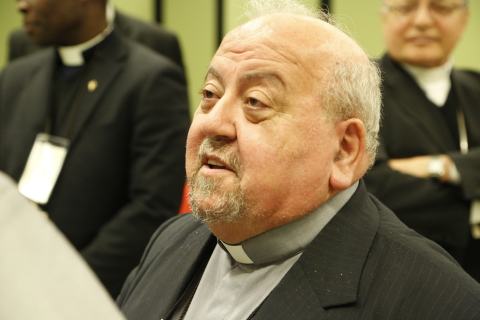
Mar 2, 2016 | Focolare Worldwide
 Peace as a prerequisite to any other action in favour of Syria: is the opinion of Bishop Samir Nassar, Maronite Archbishop of Damascus, during the convention of the Bishop friends of the Focolare held in Castelgandolfo from 23to 26 February, on the eve of the ceasefire in the Country. It is Bishop Nassar’s second time to attend this event on the hills of Rome and he said: “the first meeting had enriched me so much that I decided to return… I come from Damascus, a place tormented by violence and war, and this is a break which allows me, with my brother bishops and the attention of the Focolare, to look beyond, and have a more global vision of the future of the world, the Church, and Christians in the Middle East. Thus it is fraternal support which this event gives me, for the life of my diocese.” In the face of the war conditions his country is undergoing, Bishop Nassar forcefully stresses that “the Church of Syria refuses to die and is holding onto the hope of concrete signs. In 2015, for example, we started to build three chapels precisely when the people were leaving, to imbue hope to the faithful in the outskirts and where people no longer came to the cathedral for security reasons. We keep hope alive also through the vocations: there are young priests and seminarians who arrive, and this a sign of vitality and hope for the future.”
Peace as a prerequisite to any other action in favour of Syria: is the opinion of Bishop Samir Nassar, Maronite Archbishop of Damascus, during the convention of the Bishop friends of the Focolare held in Castelgandolfo from 23to 26 February, on the eve of the ceasefire in the Country. It is Bishop Nassar’s second time to attend this event on the hills of Rome and he said: “the first meeting had enriched me so much that I decided to return… I come from Damascus, a place tormented by violence and war, and this is a break which allows me, with my brother bishops and the attention of the Focolare, to look beyond, and have a more global vision of the future of the world, the Church, and Christians in the Middle East. Thus it is fraternal support which this event gives me, for the life of my diocese.” In the face of the war conditions his country is undergoing, Bishop Nassar forcefully stresses that “the Church of Syria refuses to die and is holding onto the hope of concrete signs. In 2015, for example, we started to build three chapels precisely when the people were leaving, to imbue hope to the faithful in the outskirts and where people no longer came to the cathedral for security reasons. We keep hope alive also through the vocations: there are young priests and seminarians who arrive, and this a sign of vitality and hope for the future.”
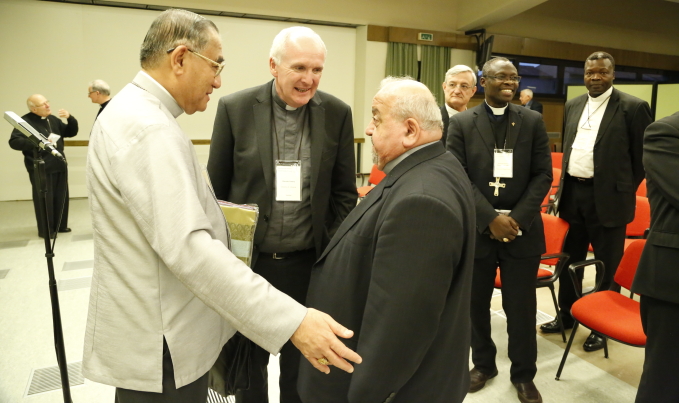 The Archbishop expressed his gratitude also for the work of the Focolare Movement, that continues to be present in Syria despite the conflict: “For what I see in Damascus, the Movement is really doing an excellent job with the youth, families and children – he affirmed. It encourages the people to see the future with faith and hope: this is support for the community, a sign of the Spirit that helps us pursue this path.» Also in this regard, the news of the arrival of a new focolarina in Damscus «is another sign that in Syria there is a Church that looks to the future and is not afraid to die. Your presence is a sign of hope and renewal, and I thank you all so much». It is a sign which is even more important in a country whose «people are tired of the war, suffering, and poverty, and the news is not encouraging. Our mission as the Church and as the Focolare is to give courage.”
The Archbishop expressed his gratitude also for the work of the Focolare Movement, that continues to be present in Syria despite the conflict: “For what I see in Damascus, the Movement is really doing an excellent job with the youth, families and children – he affirmed. It encourages the people to see the future with faith and hope: this is support for the community, a sign of the Spirit that helps us pursue this path.» Also in this regard, the news of the arrival of a new focolarina in Damscus «is another sign that in Syria there is a Church that looks to the future and is not afraid to die. Your presence is a sign of hope and renewal, and I thank you all so much». It is a sign which is even more important in a country whose «people are tired of the war, suffering, and poverty, and the news is not encouraging. Our mission as the Church and as the Focolare is to give courage.”
As to the international communities, Bishop Nassar saw with regret that “the world says it is very concerned about Syria, but each one says so in his own way: so much so that in the end nobody really is working for the interest of the Country.» And he launched an appeal: «Stop the war. If the war does not stop, all we are doing is useless. Let’s bring back peace and then rebuild charity and love of the Church. As Pope Francis himself says: the poor do not have a religion, only man counts. We are first of all awaiting steps towards peace, the rest is secondary.”
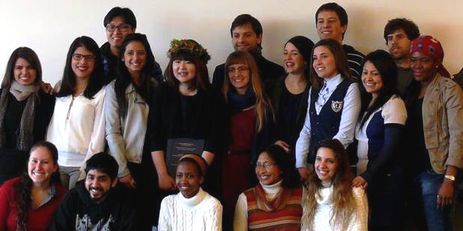
Mar 1, 2016 | Focolare Worldwide
 “When the administrative staff informed us that it was the 100th degree to be conferred, I thought it couldn’t have been otherwise. Each graduate has marked an important moment in our journey, but the fact that the hundredth dissertation was to be conferred precisely on Akie Otomo, was significant for us.” comments Judith Povilus, vice-president of Sophia University Institute, who accompanied the academic path of Akie Otomo and Yukie Ohi, two students of the Buddhist movement, Risshō Kōsei-kai, who have completed a degree in Foundations and Perspectives of a Culture of Unity. Yukie Ohi graduated in the summer semester last year, while on 11 February 2016 it was Akie Otomo’s turn. The success of her research was greeted by a warm applause emphasizing its appreciation by the whole academic community. The subject of the thesis, a comparison between “The hoza in Risshō Kōsei-kai” and “the life of unity in the spirituality of the Focolare Movement”, matured in a climate of mutual listening and acceptance with the active involvement of the two professors who guided the student: Anna Pelli, Professor of Philosophy, and Antonella Deponte, Professor of Psychology. “The focal point is of great interest as it deals with two such diverse associations, the Risshō Kōsei-kai and the Focolare Movement, yet their pulse beats as one: communion. And this was accomplished by implementing two unique practices: on the one hand the hoza, which is characteristic of the “cycle of compassion”, whereby a group of people meet to share their personal problems and find mutual support in the light of the teachings of Buddha, and on the other hand, the “spiritual communion” guided by the words of the Gospel, which makes it possible for people to share their experiences and to walk together towards God.” As the work progressed, it became increasingly clear that it could only be understood if channelled into the prophetic experience resulting from the meetings of dialogue between Nikkyo Niwano and Chiara Lubich, two eminent figures of the twentieth century: the first, the Buddhist founder and leader of Risshō Kōsei-kai, the only non-Christian observer at Vatican II; and the second, a Catholic woman who inspired a worldwide movement of spiritual renewal that speaks to the hearts of men and women of different faiths and cultures. Over the years, many similarities have led them to work together effectively for peace and mutual understanding between people and nations, reaching the point of giving their own particular experience of faith. Among other things, the thesis documents the exchange of correspondence between them, citing some paragraphs which allowed the Japanese student to focus in a surprising way on some of the cornerstones of the culture of unity, which, in her views, open up dialogue and sharing. “It was on this foundation,” says Professor Pelli, “that the intuition that guided Akie in her research took shape. In the process, each of us experienced the meeting point of that which is real dwelling in ourselves and the truth dwelling in the other; we discovered that this connection was something that in a certain way already belonged to us while at the same time it opened us up to broader perspectives. I am convinced that this experience is the fruit of being in this privileged place, at Sophia University, which strives daily to ensure that life and thought, intellectual pursuit and existential approach work towards a substantial converging towards the good, through the reciprocal gift of our diversity.” “I am very grateful for the time I spent in Sophia,” Akie concluded in her presentation. “Not only have I come closer to knowing Chiara Lubich’s thoughts, which I appreciate so much, but also to get to know more deeply the life and message of Nikkyo Niwano. I wish to take ahead this research. I want to be more committed in my daily life so that through the contribution of all religions, we can bring about harmony, unity and peace in the world.” Souce: Sophia University Institute Online
“When the administrative staff informed us that it was the 100th degree to be conferred, I thought it couldn’t have been otherwise. Each graduate has marked an important moment in our journey, but the fact that the hundredth dissertation was to be conferred precisely on Akie Otomo, was significant for us.” comments Judith Povilus, vice-president of Sophia University Institute, who accompanied the academic path of Akie Otomo and Yukie Ohi, two students of the Buddhist movement, Risshō Kōsei-kai, who have completed a degree in Foundations and Perspectives of a Culture of Unity. Yukie Ohi graduated in the summer semester last year, while on 11 February 2016 it was Akie Otomo’s turn. The success of her research was greeted by a warm applause emphasizing its appreciation by the whole academic community. The subject of the thesis, a comparison between “The hoza in Risshō Kōsei-kai” and “the life of unity in the spirituality of the Focolare Movement”, matured in a climate of mutual listening and acceptance with the active involvement of the two professors who guided the student: Anna Pelli, Professor of Philosophy, and Antonella Deponte, Professor of Psychology. “The focal point is of great interest as it deals with two such diverse associations, the Risshō Kōsei-kai and the Focolare Movement, yet their pulse beats as one: communion. And this was accomplished by implementing two unique practices: on the one hand the hoza, which is characteristic of the “cycle of compassion”, whereby a group of people meet to share their personal problems and find mutual support in the light of the teachings of Buddha, and on the other hand, the “spiritual communion” guided by the words of the Gospel, which makes it possible for people to share their experiences and to walk together towards God.” As the work progressed, it became increasingly clear that it could only be understood if channelled into the prophetic experience resulting from the meetings of dialogue between Nikkyo Niwano and Chiara Lubich, two eminent figures of the twentieth century: the first, the Buddhist founder and leader of Risshō Kōsei-kai, the only non-Christian observer at Vatican II; and the second, a Catholic woman who inspired a worldwide movement of spiritual renewal that speaks to the hearts of men and women of different faiths and cultures. Over the years, many similarities have led them to work together effectively for peace and mutual understanding between people and nations, reaching the point of giving their own particular experience of faith. Among other things, the thesis documents the exchange of correspondence between them, citing some paragraphs which allowed the Japanese student to focus in a surprising way on some of the cornerstones of the culture of unity, which, in her views, open up dialogue and sharing. “It was on this foundation,” says Professor Pelli, “that the intuition that guided Akie in her research took shape. In the process, each of us experienced the meeting point of that which is real dwelling in ourselves and the truth dwelling in the other; we discovered that this connection was something that in a certain way already belonged to us while at the same time it opened us up to broader perspectives. I am convinced that this experience is the fruit of being in this privileged place, at Sophia University, which strives daily to ensure that life and thought, intellectual pursuit and existential approach work towards a substantial converging towards the good, through the reciprocal gift of our diversity.” “I am very grateful for the time I spent in Sophia,” Akie concluded in her presentation. “Not only have I come closer to knowing Chiara Lubich’s thoughts, which I appreciate so much, but also to get to know more deeply the life and message of Nikkyo Niwano. I wish to take ahead this research. I want to be more committed in my daily life so that through the contribution of all religions, we can bring about harmony, unity and peace in the world.” Souce: Sophia University Institute Online

Feb 28, 2016 | Focolare Worldwide
 Having mentioned some of the challenges in the world today – the threats to peace and the search for and affirmation of identity – Maria Voce offered some reflections arising out of Chiara Lubich’s charismatic experience of dialogue. Her talk was given on 26th January at the India International Centre in New Delhi If we seek to grasp the specific characteristics of the Movement’s dialogue, the first of them can be seen as its foundation. Chiara [Lubich] always taught us to look to God as the one Father of all and as a result, to see every man or woman we meet as his son or daughter, and therefore our brother or sister. Chiara herself said this, writing to her companions in 1947: “We must keep our gaze fixed on the one Father of so many children, and then consider all people as children of that one Father. Our thoughts and affections must go beyond every human limit and acquire the habit of aiming constantly towards this universal brotherhood in our one Father: God.”[i] I remember how happy Chiara was when she told us what our dear Professor Kala Acharya said after their meeting in India in 2001: “Each had grown up enclosed behind its own walls, admiring its own garden, without knowing that on the other side of these very high walls there are beautiful gardens to behold. Now is the time to break down the walls and discover each other’s garden.” If this is the foundation, the dialogical method that Chiara taught us cannot be other than love! It is a dialogue among brothers and sisters, therefore a dialogue among people, not between ideologies or thought systems. Dialogue must necessarily be supported and sustained by mercy, compassion and charity, summed up in the Golden Rule [do to others as you would have them do to you”. Love and mercy, once put at the basis of dialogue, not only enable us to see the people alongside us in a new light, but help us discover diversity, whatever it is, as a gift. Chiara said: “Whoever is close to me has been created as a gift for me and I have been created as a gift for those near me. On earth everything is in a relationship of love with everything else: each thing with each thing. But we need to be Love in order to find the golden thread of love between beings”[ii]. Nowadays, contacts are being multiplied, due to the great many possibilities offered by all the communications media. But these become short, ephemeral, lacking meaning, while at the same time relationships break down or diminish. Only when the I-you relationship includes a love which goes beyond purely natural dimensions, can contacts be transformed into relationships, and we can truly build networks of brotherhood. In this regard religion is called to help give meaning and a soul, as well as true and satisfying answers, to humankind which is so confused and lost and traumatised today. Over the years, we have seen the irreplaceable role religions have to lead their faithful to recognise one another reciprocally, to respect one another, to collaborate and become front runners in building a peaceful world, where justice and respect for the human person prevail. Chiara Lubich, founder of the Focolare Movement, lived and spread this adventure to all those who are inspired by her, an adventure in which any kind of love is not enough, but it is necessary rather to learn an art, as she herself said: the “art of loving”. … If we were all to live this “art”, we would be practising some of the indispensible principles for dialogue among religions. I’ll mention just a few: Unity in diversity. It is necessary for every religion to be welcomed in full respect for all that it considers sacred according to its own tradition. Proselytism and syncretism are incompatible with peace. Reciprocity in relationships In sharing a lived spirituality, each person is enriched not only without risk of compromising their own faith, but with the opportunity to deepen it. Equality in our shared human dignity This is the key to any type of harmonious relationship with a view to collaborating in building democratic societies founded on peace. Many of you know that the charism of Chiara Lubich, founder of the focolare Movement, can be summed up in a single word: unity. It is the specific vocation of the whole Movement, which is committing itself to live unity this year with greater intensity. We want to work and commit ourselves on all fronts to contribute to building a united world, to bring unity peace and reciprocity in every place. Faithfulness to our charism demands this, faithfulness to the first intuition that Chiara expressed in 1946: “In our hearts, one thing is clear: unity is what God wants from us. We live in order to be one with Him and among us and with everyone. This splendid vocation binds us to heaven and immerses us in a universal brotherhood. Nothing could be greater. For us, there could be no loftier Ideal.”[iii]». New Delhi 20th January 2016 [i] C. LUBICH, L’arte di amare, Città Nuova, Roma 2005, p. 29 [ii] C. LUBICH, Scritti Spirituali 1, “L’attrattiva del tempo moderno”, Città Nuova, Roma 1978, 140. [iii]». Cf. C. Lubich, Unity and Jesus Forsaken, New City New York 1985, p. 26.
Having mentioned some of the challenges in the world today – the threats to peace and the search for and affirmation of identity – Maria Voce offered some reflections arising out of Chiara Lubich’s charismatic experience of dialogue. Her talk was given on 26th January at the India International Centre in New Delhi If we seek to grasp the specific characteristics of the Movement’s dialogue, the first of them can be seen as its foundation. Chiara [Lubich] always taught us to look to God as the one Father of all and as a result, to see every man or woman we meet as his son or daughter, and therefore our brother or sister. Chiara herself said this, writing to her companions in 1947: “We must keep our gaze fixed on the one Father of so many children, and then consider all people as children of that one Father. Our thoughts and affections must go beyond every human limit and acquire the habit of aiming constantly towards this universal brotherhood in our one Father: God.”[i] I remember how happy Chiara was when she told us what our dear Professor Kala Acharya said after their meeting in India in 2001: “Each had grown up enclosed behind its own walls, admiring its own garden, without knowing that on the other side of these very high walls there are beautiful gardens to behold. Now is the time to break down the walls and discover each other’s garden.” If this is the foundation, the dialogical method that Chiara taught us cannot be other than love! It is a dialogue among brothers and sisters, therefore a dialogue among people, not between ideologies or thought systems. Dialogue must necessarily be supported and sustained by mercy, compassion and charity, summed up in the Golden Rule [do to others as you would have them do to you”. Love and mercy, once put at the basis of dialogue, not only enable us to see the people alongside us in a new light, but help us discover diversity, whatever it is, as a gift. Chiara said: “Whoever is close to me has been created as a gift for me and I have been created as a gift for those near me. On earth everything is in a relationship of love with everything else: each thing with each thing. But we need to be Love in order to find the golden thread of love between beings”[ii]. Nowadays, contacts are being multiplied, due to the great many possibilities offered by all the communications media. But these become short, ephemeral, lacking meaning, while at the same time relationships break down or diminish. Only when the I-you relationship includes a love which goes beyond purely natural dimensions, can contacts be transformed into relationships, and we can truly build networks of brotherhood. In this regard religion is called to help give meaning and a soul, as well as true and satisfying answers, to humankind which is so confused and lost and traumatised today. Over the years, we have seen the irreplaceable role religions have to lead their faithful to recognise one another reciprocally, to respect one another, to collaborate and become front runners in building a peaceful world, where justice and respect for the human person prevail. Chiara Lubich, founder of the Focolare Movement, lived and spread this adventure to all those who are inspired by her, an adventure in which any kind of love is not enough, but it is necessary rather to learn an art, as she herself said: the “art of loving”. … If we were all to live this “art”, we would be practising some of the indispensible principles for dialogue among religions. I’ll mention just a few: Unity in diversity. It is necessary for every religion to be welcomed in full respect for all that it considers sacred according to its own tradition. Proselytism and syncretism are incompatible with peace. Reciprocity in relationships In sharing a lived spirituality, each person is enriched not only without risk of compromising their own faith, but with the opportunity to deepen it. Equality in our shared human dignity This is the key to any type of harmonious relationship with a view to collaborating in building democratic societies founded on peace. Many of you know that the charism of Chiara Lubich, founder of the focolare Movement, can be summed up in a single word: unity. It is the specific vocation of the whole Movement, which is committing itself to live unity this year with greater intensity. We want to work and commit ourselves on all fronts to contribute to building a united world, to bring unity peace and reciprocity in every place. Faithfulness to our charism demands this, faithfulness to the first intuition that Chiara expressed in 1946: “In our hearts, one thing is clear: unity is what God wants from us. We live in order to be one with Him and among us and with everyone. This splendid vocation binds us to heaven and immerses us in a universal brotherhood. Nothing could be greater. For us, there could be no loftier Ideal.”[iii]». New Delhi 20th January 2016 [i] C. LUBICH, L’arte di amare, Città Nuova, Roma 2005, p. 29 [ii] C. LUBICH, Scritti Spirituali 1, “L’attrattiva del tempo moderno”, Città Nuova, Roma 1978, 140. [iii]». Cf. C. Lubich, Unity and Jesus Forsaken, New City New York 1985, p. 26.

 “We cannot talk about evangelization in Fontem without the Focolare Movement,” said Bishop Nkea standing in front of the television cameras during his visit to the International Centre in Rocca di Papa, Italy, on March 8. “Chiara Lubich went to Fontem 50 years ago, and she brought the Ideal [spirituality of unity]. That is why we have come here: to thank Chiara and the Movement for everything it has done for us in these 50 years. This is a pilgrimage of thanksgiving.” “The Diocese of Mamfe did not exist 50 years ago and Fontem was a lost village in the Cameroonian forest that was difficult to reach.” We cannot understand the Bishop’s words without returning to the history of an event that has been called the “miracle in the forest”. Fontem was the first permanent Mariapolis on the African continent. In 1966, several focolarini, doctors, went to help the Bangwa people who were being decimated with an infant mortality rate of 98%. A few months later, Chiara herself visited them: “That huge crowd of people gathered on the vast plane in front of the home of their Fon,” she would say in 1995, “appeared so united and so anxious to be elevated [. . .] that it seemed to me long prepared by Mary to embrace the Christian faith in its most integral and genuine form.” “The focolarini were believed because they did to Jesus what they did to the Bangwa, offering, above all, a witness of the love amongst themselves and towards everyone.”
“We cannot talk about evangelization in Fontem without the Focolare Movement,” said Bishop Nkea standing in front of the television cameras during his visit to the International Centre in Rocca di Papa, Italy, on March 8. “Chiara Lubich went to Fontem 50 years ago, and she brought the Ideal [spirituality of unity]. That is why we have come here: to thank Chiara and the Movement for everything it has done for us in these 50 years. This is a pilgrimage of thanksgiving.” “The Diocese of Mamfe did not exist 50 years ago and Fontem was a lost village in the Cameroonian forest that was difficult to reach.” We cannot understand the Bishop’s words without returning to the history of an event that has been called the “miracle in the forest”. Fontem was the first permanent Mariapolis on the African continent. In 1966, several focolarini, doctors, went to help the Bangwa people who were being decimated with an infant mortality rate of 98%. A few months later, Chiara herself visited them: “That huge crowd of people gathered on the vast plane in front of the home of their Fon,” she would say in 1995, “appeared so united and so anxious to be elevated [. . .] that it seemed to me long prepared by Mary to embrace the Christian faith in its most integral and genuine form.” “The focolarini were believed because they did to Jesus what they did to the Bangwa, offering, above all, a witness of the love amongst themselves and towards everyone.”  Today there is a hospital in Fontem, Mary Health of Africa, which serves a large part of the region; and a college, Mary Seat of Wisdom, which prepares students for university. With the help of focolarini priests, parishes have been opened in Menji, Fotabong, Fonjumetaw. Bishop Nkea declared: “Mainly, we learned mutual love and unity. I’m also Bangwa, so I’m speaking in the name of my people.” “We learned interreligious dialogue: What is important for us now is that we love one another, whether we are Christian or not, to live in this unity with each other.”
Today there is a hospital in Fontem, Mary Health of Africa, which serves a large part of the region; and a college, Mary Seat of Wisdom, which prepares students for university. With the help of focolarini priests, parishes have been opened in Menji, Fotabong, Fonjumetaw. Bishop Nkea declared: “Mainly, we learned mutual love and unity. I’m also Bangwa, so I’m speaking in the name of my people.” “We learned interreligious dialogue: What is important for us now is that we love one another, whether we are Christian or not, to live in this unity with each other.”  The delegation that had come to render homage to Chiara Lubich included bishops – Bishop Nkea and Emeritus Bishop Lysinge who was celebrating the 50th anniversary of his ordination to the priesthood – priests, women religious and many lay people. They are a living testimony to the communion in the diocese. They were welcomed at the International Centre of the Focolare by the Movement’s president, Maria Voce – who first visited Fontem in January 2009 – and the Movement’s co-president, Jesús Morán, who will visit Fontem this coming December. The visit of the delegation marked the opening of the 50th anniversary celebrations of the arrival of the spirituality of unity in Fontem (1966-2016) and will continue through the year. The visit to Chiara’s house was particularly moving. The day concluded with a solemn Mass in the chapel where Chiara rests. “Your pilgrimage here today bears witness to the fruits produced by that first visit of Chiara, which launched a Divine adventure that no one ever imagined,” Maria Voce said as she welcomed them. “You are the fruit of the life of these 50 years. It is a great joy for us and shows us the vitality of Africa. Fifty years have gone by and our wish to each other now is that we begin a new period, hopefully a long period for offering to God trees covered with fruits and with blossoms.” Jesús Morán commented: “There is an exchange of gifts between Africa and us. The charism of unity is a gift for Africa, and Africa is a gift for the whole Movement.”
The delegation that had come to render homage to Chiara Lubich included bishops – Bishop Nkea and Emeritus Bishop Lysinge who was celebrating the 50th anniversary of his ordination to the priesthood – priests, women religious and many lay people. They are a living testimony to the communion in the diocese. They were welcomed at the International Centre of the Focolare by the Movement’s president, Maria Voce – who first visited Fontem in January 2009 – and the Movement’s co-president, Jesús Morán, who will visit Fontem this coming December. The visit of the delegation marked the opening of the 50th anniversary celebrations of the arrival of the spirituality of unity in Fontem (1966-2016) and will continue through the year. The visit to Chiara’s house was particularly moving. The day concluded with a solemn Mass in the chapel where Chiara rests. “Your pilgrimage here today bears witness to the fruits produced by that first visit of Chiara, which launched a Divine adventure that no one ever imagined,” Maria Voce said as she welcomed them. “You are the fruit of the life of these 50 years. It is a great joy for us and shows us the vitality of Africa. Fifty years have gone by and our wish to each other now is that we begin a new period, hopefully a long period for offering to God trees covered with fruits and with blossoms.” Jesús Morán commented: “There is an exchange of gifts between Africa and us. The charism of unity is a gift for Africa, and Africa is a gift for the whole Movement.” 



 Fidelia also showed us other aspects of the life of Central Africa. She told us, for example, that in recent weeks she and three others of the Bangui had treked 400 km to reach the small city of Bambio, where a small community animated by the spirituality of the Focolare was begun with the help of a Capuchin missionary. Fidelia recounts: “We met several families there, many young people, all of them very motivated. Even though Father Umberto had to return to Italy, they carried on for all these years, continuing to gather and encourage one another in living the Gospel, with the help of a book by Chiara Lubich which he had left to them.” Meeting this community that had kept the flame of the Gospel burning for over twenty years, filled her with joy and amazement. But they had no idea that there was another surprise in store for them in that village. There are several Pygmy villages in the surrounding areas. They are known for their small stature and living primarily in the forests with their own customs and rules. Fidelia explained: “Many people think that it’s not easy to establish a relationship with them, but having to cross through their settlements, it was only natural that we stop and visit with them, and tell them what we were doing in those parts. Encouraged by their openness and their willingness, we got to know each other and shared about the values we believe in. Some of them showed great feeling for
Fidelia also showed us other aspects of the life of Central Africa. She told us, for example, that in recent weeks she and three others of the Bangui had treked 400 km to reach the small city of Bambio, where a small community animated by the spirituality of the Focolare was begun with the help of a Capuchin missionary. Fidelia recounts: “We met several families there, many young people, all of them very motivated. Even though Father Umberto had to return to Italy, they carried on for all these years, continuing to gather and encourage one another in living the Gospel, with the help of a book by Chiara Lubich which he had left to them.” Meeting this community that had kept the flame of the Gospel burning for over twenty years, filled her with joy and amazement. But they had no idea that there was another surprise in store for them in that village. There are several Pygmy villages in the surrounding areas. They are known for their small stature and living primarily in the forests with their own customs and rules. Fidelia explained: “Many people think that it’s not easy to establish a relationship with them, but having to cross through their settlements, it was only natural that we stop and visit with them, and tell them what we were doing in those parts. Encouraged by their openness and their willingness, we got to know each other and shared about the values we believe in. Some of them showed great feeling for


